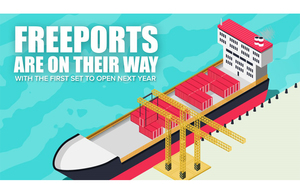Government outlines new plans for Freeports to turbo-charge post-Brexit trade
News story
The government has today set out further details around how it will create a number of new innovative Freeports across the UK to create jobs, drive investment and regenerate communities.

- next steps set out today for the creation of Freeports, driving investment and creating jobs after the end of the transition period
- Freeport bidding process in England to open before the end of the year
- the first Freeports on track to be open by the end of 2021
Responding to the consultation on the proposals the government confirmed that sea, air and rail ports in England will be invited to bid for Freeport status before the end of the year, with the government aiming for the first of the new sites to be open for business in 2021.
It also confirmed the Freeports will benefit from:
- streamlined planning processes to aid brownfield redevelopment
- a package of tax reliefs to help drive jobs, growth and innovation
- simplified customs procedures and duty suspensions on goods
Seizing on the opportunities presented by leaving the EU, Freeports will be created across the nation to help drive Britain’s post-Brexit growth.
Designed to attract major domestic and international investment, the hubs of enterprise will allow places to carry out business inside a country’s land border but where different customs rules apply. They have been successfully used in countries around the world to drive prosperity and boost trade.
The Chancellor of the Exchequer, Rishi Sunak, said:
Our new Freeports will create national hubs for trade, innovation and commerce, regenerating communities across the UK and supporting jobs.
They will attract investment from around the world as we embrace new opportunities following our departure from the EU and will be a key driver for economic recovery as we build back better post coronavirus.
The government is working constructively and collaboratively with the devolved administrations to seek to establish at least one Freeport in each nation of the UK.
Further information
- At the centre of the new Freeports policy is an ambitious new customs model, drawing on international best practice. The flexible model will improve upon both the UK’s existing customs arrangements and the Freeports the UK had previously.
- The government will also introduce a package of tax reliefs on investment by businesses within Freeport tax sites, new measures to speed up planning processes to accelerate development in and around Freeports and new initiatives to encourage innovators to generate new ideas to create additional economic growth and jobs.
- A firm can import goods into a Freeport without paying tariffs, process them into a final good and then either pay a tariff on goods sold into the domestic market, or export the final goods without paying UK tariffs.
- The government wishes to deliver Freeports as soon as possible and will make further announcements in due course.
- We want all the nations of the UK to share in the benefits of Freeports. As such, we are working constructively and collaboratively with the devolved administrations to ensure Freeports are a UK-wide offer that will enable the creation of Freeports in England, Wales, Scotland and Northern Ireland.
- Freeports will be selected through a fair, transparent and competitive process, and will be expected to collaborate closely with key partners across the public and private sectors. The Bidding Process for locations to become a Freeport in England will open by the end of 2020.
- See the Freeports Response to the Consultation.
Published 7 October 2020